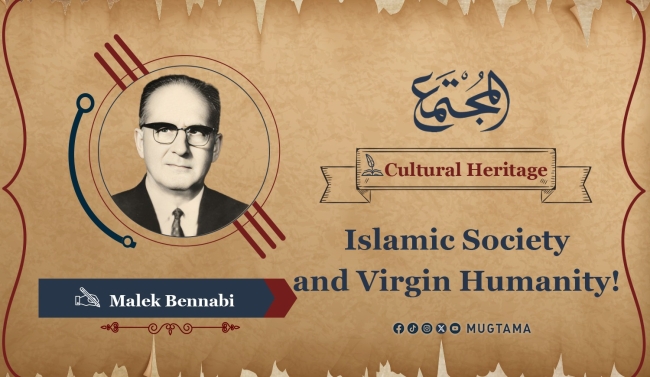The issue that has preoccupied my thoughts and captured my interest for more than a quarter of a century—up until now—is the problem of civilization and how to find practical solutions to it. Specifically, how to remove the contradiction between material success and moral decline, by which I mean the neglect or deterioration of values. I became deeply aware of this problem a long time ago, particularly when I arrived in Europe to pursue knowledge in 1930. I realized then that contemporary societies face highly complex and multifaceted problems.
Since it is expected from politicians to address these problems in all their diversity and multiplicity and strive to find suitable solutions for them, and intellectuals in advanced nations also have the right to engage with these issues, then it is even more imperative for both politicians and intellectuals in underdeveloped countries to dedicate increased attention to studying these problems within their societies and to exert themselves in finding appropriate solutions for them.
One of the critical mistakes and dangers that some Islamic countries have faced is that they have approached their problems and devised solutions based on the patterns and models that advanced nations used to solve their own challenges. While this approach is politically dangerous in terms of practical application, it is even more dangerous from a theoretical perspective, especially since theoretical foundations are what inspire the solutions that are implemented. The result is that our political reality remains confined by intellectual efforts that are unsuitable for our context, as they violate a fundamental principle of the philosophy of history.
We can bring this reality closer to the reader’s understanding by applying it at the level of individuals. It is universally accepted that the efforts and burdens that a fully grown man can endure cannot be borne by a small child or an elderly person. Likewise, societies also have their respective ages: a society in the prime of its youth can bear and produce as much as thriving civilizations do; a newly emerging society, however, does not yet have the strength to handle the same burdens as the first society; and a third society, which has grown old, cannot undertake major tasks because it has been overtaken by its own aging process.
If we translate these analogies into sociological terms, we can confidently state that the Islamic world today consists of human elements that still represent what we call “virgin humanity”—that is, humanity that has not yet entered a cycle of civilization. For this reason, it retains all its historical reserves, which fills it with optimism about its future.
At the same time, the Islamic world is also made up of human elements that played a significant civilizational role and illuminated humanity for centuries during their period of prosperity. However, these societies have experienced what all civilizations eventually face—they have aged and declined. Consequently, they may find themselves incapable of undertaking the same responsibilities that other more developed nations can, simply because they have reached an advanced stage of decline.
Thus, the primary problem—the root of all problems—that the Islamic world faces is the problem of civilization, from two perspectives: first, how can societies that are still in their “virgin” state enter a new civilizational cycle? And second, how can Islamic societies that have exited the stage of history re-enter a new phase of civilization?
If we accept these realities, then we must also consider the future of the Islamic world and how it can enter a new cycle of civilization. This issue, in essence, is the one to which I have devoted all my modest efforts for the past thirty years. There is no need for an extended discussion to affirm that Islamic thought has indeed provided solutions to the problems facing the Islamic world, as well as to the issues and challenges that modern humanity struggles with.
The Noble Quran has already provided solutions to these issues and challenges, and we must work in light of this truth. In terms of the social problems that humanity faces, the Quran has established a legal framework for social interactions, including marriage, cohabitation, divorce, and so forth. It has also laid down regulations for worldly affairs such as trade, buying, and selling. Furthermore, the Quran instills within our belief system the necessary dispositions that qualify us to implement these social laws, while also encouraging creativity and innovation.
The conclusions of my studies on this subject can be summarized in a set of key points, the most important of which is that civilization is not built by importing foreign civilizational products; rather, civilization itself produces its own cultural and material products. This leads us to the traditional question: what are the fundamental conditions for civilization in its essence? The answer, without unnecessary elaboration, is that civilization is built upon three essential elements: human beings, land, and time. If we examine these elements carefully, we can extract the meaning we seek.
But if these three elements are the necessary conditions for civilization, then why do civilizations not emerge in societies where these conditions are present? After all, the developing world contains the largest human population, the most fertile lands, and has just as much time as the nations that have established civilizations. And yet, civilizations like those in the leading nations do not exist there.
In my view, the reason for this is that these elements require an additional factor—one that is indispensable. This is the psychological factor, which some refer to as “belief,” while others call it “ideology.”
Thus, we are confronted with an undeniable truth: the essential conditions for civilization are already present. What is missing is action based on the principles of Islamic belief.
Islam alone is capable of restoring Muslims to the realm of a productive and creative civilization or introducing them into its domain. However, this is conditional upon Muslims considering this belief system as a vital and indispensable message. Nevertheless, belief alone cannot unleash human potential unless it is directed toward needs that are greater, nobler, and more significant than mere daily necessities.
-------------------------------------------------------------
Taken from the Book: Scholars and Flags who Wrote in Islamic Awareness Kuwaiti Magazine.







